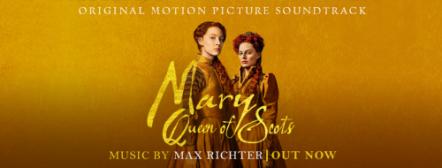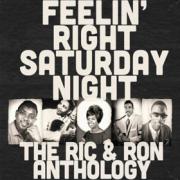New York, NY (Top40 Charts) Throughout Mary
Queen of Scots, composer Max Richter's score helps establish not only the rich, historically redolent atmosphere of the film, but also its profound emotional resonance. Martial drums set against female voices, ambient lyricism and stately dances, stirring melody borne along strings and winds - Richter's music colours and deepens virtually every scene, making the period political drama feel timeless and personal. The original motion picture soundtrack album to Mary
Queen of Scots is released today via Deutsche Grammophon/Universal
Music Canada, the country's leading music company.
The film, a Focus Features presentation, is directed by Josie Rourke and starring Saoirse Ronan in the title role and Margot Robbie as
Elizabeth I.
Mary
Queen of Scots - based on
Dr. John Guy's book
Queen of Scots: The True Life of Mary
Stuart - breaks the title figure free from misconceptions of her as a weak or sexually promiscuous monarch. The film depicts the betrayal and rebellion within Mary's turbulent court where the men around the queen unceasingly plotted her downfall. The story unfolds against the backdrop of Mary's relationship with her cousin,
Queen Elizabeth I of England. Two women who uniquely understood, captivated and challenged each other, they were both forced to make sacrifices in a male-dominated world - and each experienced the bitter price of power.
Richter produced the Mary
Queen of Scots soundtrack, which features his score along with the period vocal motet "If Ye Love Me" by the great English composer
Thomas Tallis (1505-85). About composing music for the film, Richter says: "One of the nice things about this project is that it gave me the opportunity to return to Renaissance music, which I love. Although the film is a historical piece, it has modernity within it, in the way the themes of the story are engaged. This dialogue between historical material and contemporary technique is an important part of my compositional practice."
About the striking elements of his score, and how they illustrate the dramatic tension between potential understanding and tragic reality, Richter explains: "I wanted the film to have a very strong sense of these women's voices, which are the first and last sounds we hear in the score. I've used the voices as a framing device, a kind of acoustic and psychological landscape within which the story unfolds. The other elements in the score populate this landscape like foreground figures - chief among these being the drums, which signify war, the triumph of time over human intentions, and the world of male brutality. Inevitably, given the story, the image of the executioner's drum and funeral drums is also evoked, and it is the tension between those drums and the women's voices which powers much of the score."
Richter was inspired by the techniques of Elizabethan music when composing the score, even if he employed modern means. "It was wonderful pulling those two worlds together, the period and the contemporary," he says. "I used compositional techniques from the 16th Century, for example, ground bass variation technique and polyphonic choral writing, but employed these in a 21st Century manner so that, while the score strongly reminds us of the music of Mary's time, it is not faux period music but embodies the modernity of Josie's narrative approach."
Expanding on the thematic aspects of the score, Richter explains: "Mary and
Elizabeth share a theme, which illustrates the fact that, while they were adversaries, they also shared a unique and isolated position in the world of men. This music incorporates a fragment of harmony that reminds us of Handel's coronation ode from 1727, so it evokes the image of "regality" in a broader sense. Mary's own voice within this theme is portrayed by the solo Cor Anglais, which I chose for its melancholic tone colour, but also because the instrument's name rather neatly encapsulates Mary's biography, that is of a French protagonist in England. Aside from the theme of the queens, the world which they inhabit, namely the world of men, has a theme. Both the music of the queens and the music of the men are played by a large orchestra, and again, reflecting Elizabethan practice, both are structured upon a ground bass. These two musics have structural similarities but the music of the women has more sophistication in its harmonic language and greater scope for development. The music for the world of men, which I think of as a kind of orchestral death-metal, is a blunt instrument by comparison."
Summing up his vision for the score, Richter explains: "By making careful use of historical techniques within an essentially contemporary language, I'm hoping to create for listeners a sort of dialogue between separate historical moments, and this sets up a conversation in our brains that pulls us into a great, and very moving, story."
The Mary
Queen of Scots soundtrack album was recorded at Air Studios in London, with Richter producing. The performers include London Voices and the Air Lyndhurst Orchestra, with the instrumental soloists including Jane Marshall (cor anglais), Hugh Webb (harp) and Jean
Kelly (Celtic harp). Richter's score is published by Focus-Gramercy Film
Music (BMI).
Max Richter, born in 1966 in West Germany, grew up in England and studied composition and piano at the University of Edinburgh, with further training at the Royal Academy of
Music in London and with modernist composer
Luciano Berio in Italy. Richter's work embodies both the rigor of the classical tradition and the experimentalism of contemporary electronica. The BBC described his debut solo album, 2002's Memoryhouse, as "a masterpiece in neoclassical composition." His music, despite its underlying sophistication, remains accessible. Relatively uncommon among contemporary classical composers, Richter is radically unafraid of appealing directly to our emotions. Numerous classical No. 1 records around the world and sold-out performances at such esteemed venues as London's Royal Albert Hall, the Sydney Opera House, Philharmonie de Paris and Berlin's Berghain are a testament to Richter's wide appeal.
Richter's 2012 Deutsche Grammophon release, Recomposed: The Four Seasons, topped the classical charts in 22 countries. The UK's Telegraph praised the album, stating: "It is a subtle and often moving piece of work, which suggests that after years of tedious disco and trance versions of Mozart, the field of the classical remix has finally become interesting." DG reissued Richter's 2010 album Infra in 2014, with the music originally conceived as a score for London's Royal Ballet. In 2015, Richter released the eight-and-a-half-hour epic Sleep - which explores new ways for music and consciousness to interact. The recent production of the Olivier Award-winning Woolf Works with long-term collaborator Wayne McGregor at the Royal Ballet resulted in a 2017 DG album, Three Worlds, which also topped classical charts worldwide.
Richter's work in film and television includes the Golden Globe-winner Waltz with Bashir, HBO's dramatic series The Leftovers,
Jessica Chastain's Miss Sloane, Hostiles starring Christian Bale, Charlie Brooker's
Black Mirror and Tom Hardy's Taboo, the latter of which earned Richter his first Emmy Award nomination. Numerous directors, including
Martin Scorsese (Shutter Island) and Denis Villeneuve (Arrival), have employed music from Richter's catalog. In addition to Mary
Queen of Scots, Richter recently scored White Boy Rick starring Matthew McConaughey, as well as the HBO series My Brilliant Friend.





















